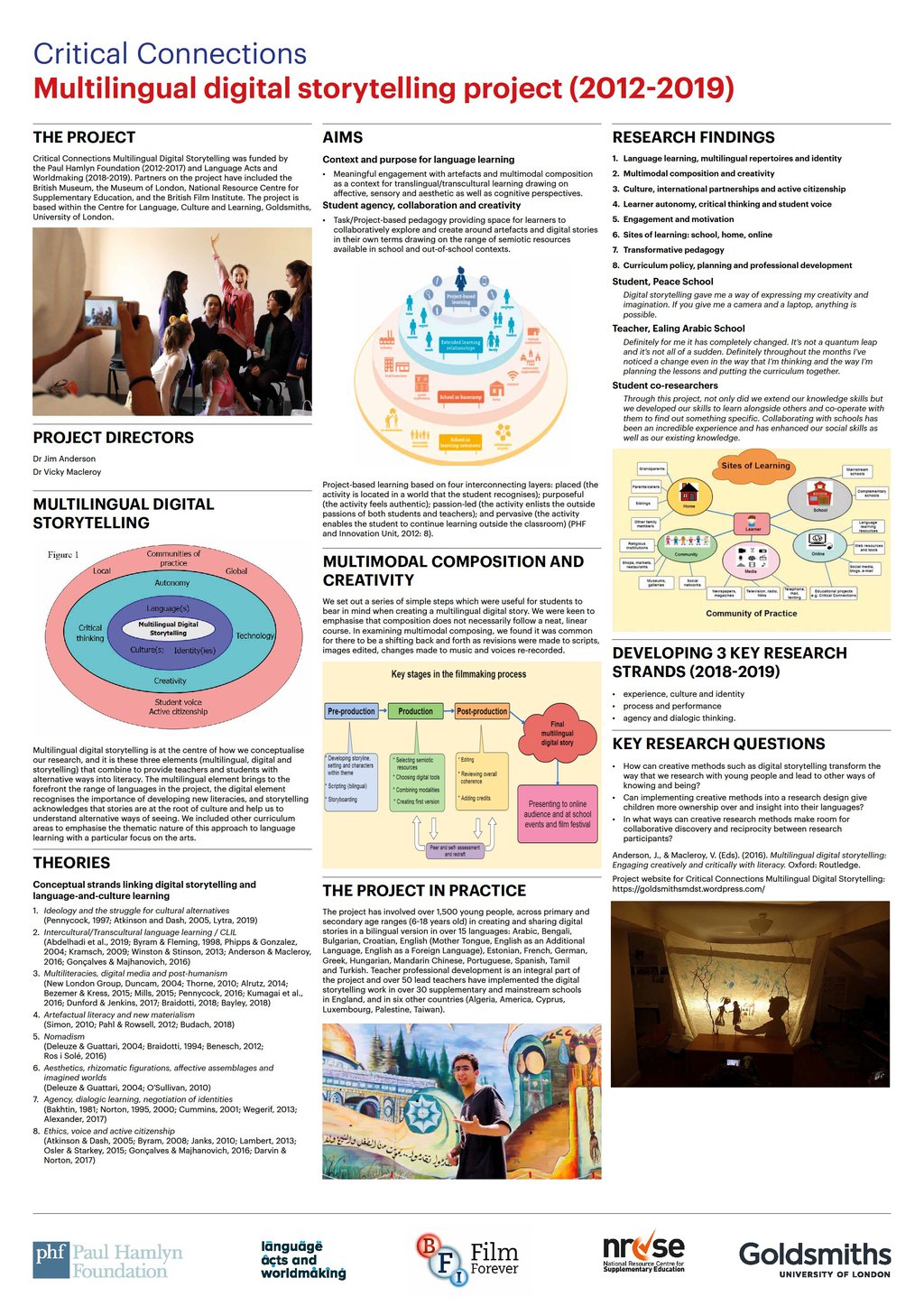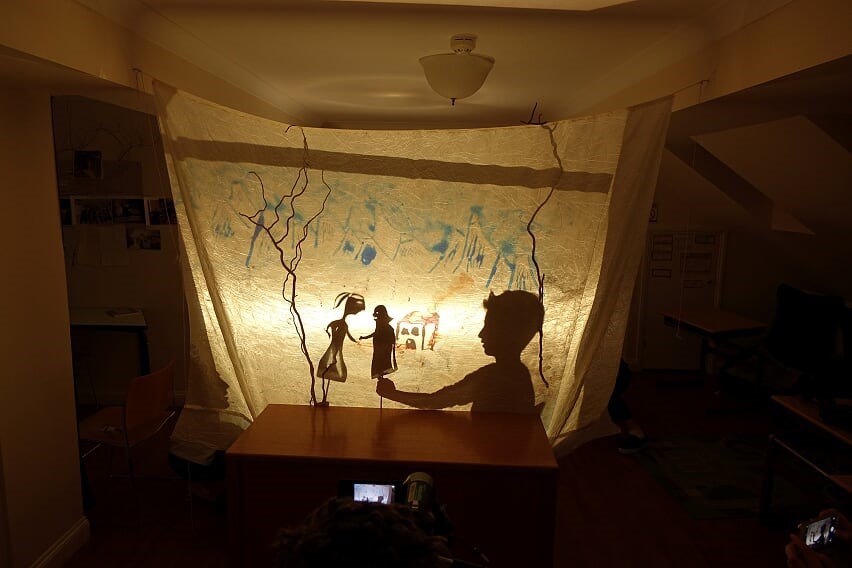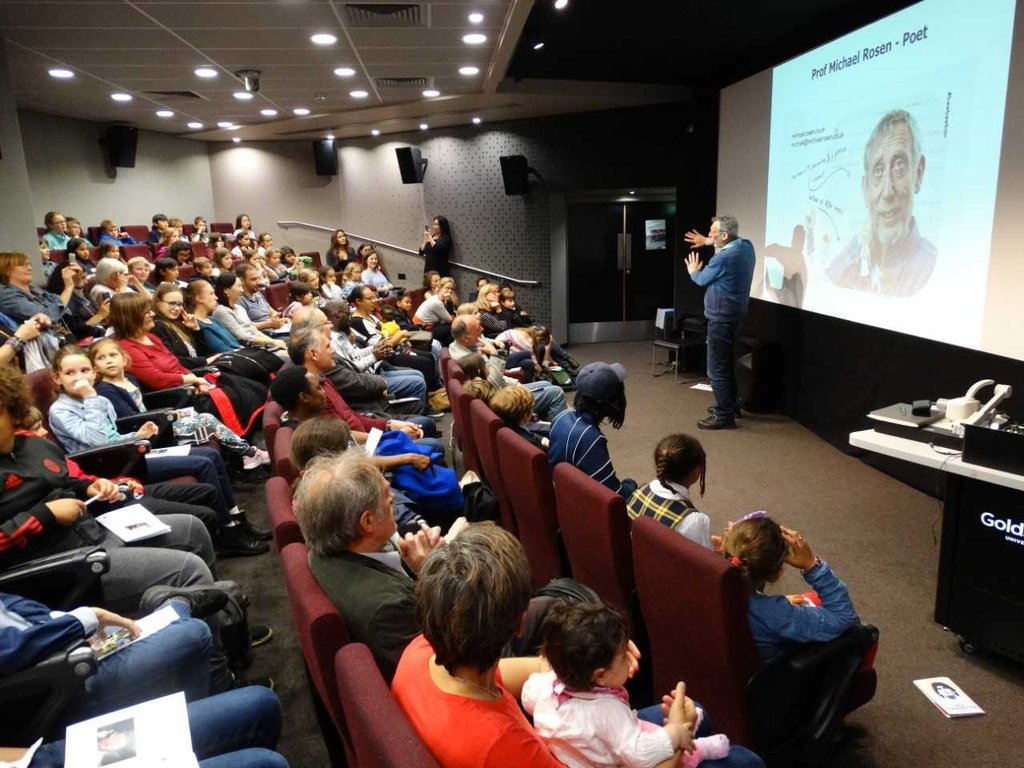
About
This conference, organized by Dr Vicky Macleroy and Dr Jim Anderson, took place on 7 June 2019 at Goldsmiths, University of London. Its aim was to build on the work of Vicky and Jim's research into multilingual digital storytelling and work around museum artefacts. It asked, what role can the arts play in enabling deeper engagement with language-and-culture learning in the contexts of multilingual digital storytelling around museum artefacts? Featuring a plenary from Prof Gabi Budach and a film festival showcase, 'Mythical Creatures and European Folk Tales', introduced by the Children's Laureate Michael Rosen, it provided an arena to reflect on new findings and consider the most productive ways to take forward work at both theoretical and more practical levels. Read Vicky and Jim's report below.
Report
Our research developed out of our interest in how to re-engage young people with language learning and develop critical and creative engagement with digital technology. Building on 7 years of research into multilingual digital storytelling and work around museum artefacts (2012 -2019) we developed 3 key strands to be explored in the conference: experience, culture and identity; process and performance; and agency and dialogic thinking.
A central question the conference addressed:
What
role can the arts play in enabling deeper engagement with language-and-culture
learning in the contexts of multilingual digital storytelling and work around
museum artefacts?
A significant feature of our multilingual digital storytelling work has been developing a shared vision between researchers and teachers in addressing the challenge of providing a more engaging and relevant language curriculum for young people. For this conference, funded by Language Acts and Worldmaking, we built on strong partnerships developed over the past years with Professor Gabriele Budach from the University of Luxembourg and Dr Chryso Charalambous, drama expert and Project Manager at the Fairy Tale Museum in Nicosia, Cyprus. These collaborations contributed to a vibrant conference in which the plenary and all the workshops were led jointly by researchers, teachers and MA students/trainee teachers. Gabriele Budach presented a fascinating plenary with her 3 MA students/trainee teachers - Dimitri Efremov, Daniela Loghin & Gohar Sharoyan – Making space for learning: Exploring affect in stop-frame animation. The students had created imaginative and engaging stop-frame animations to explore meaning making with objects as ‘vibrant matter’. The workshops were organised under the 3 key strands of the conference and run by lead teachers/researchers on the project. The workshops were firmly rooted in practice and drew on digital storytelling work across primary, secondary and complementary schools in Cyprus, England and Luxembourg. Conference participants engaged in a range of activities connected with multilingual digital storytelling and interacting with artefacts.

The conference was in high demand and we expanded the event to 65 participants to allow more people to attend. Conference participants reflected upon their overall experience of the conference:
‘Wonderful, refreshing, inspiring, uplifting.’
‘Really refreshing to see the visual and aesthetic qualities of the art we were shown at the forefront of the discussion with learners. Brilliant!’
‘Really interesting and inspiring talks. I loved the stop-motion animation. Useful workshops.’
‘Thoroughly enjoyed the workshops. It would be good to have longer – may be 2-day conference.’
‘This conference was very inspiring and creative and provided opportunities for reflections around pedagogical practices on the multimodal nature of communication.’
‘Very well organised. Had a circular structure that helped us see theory then practice and final reflection.’
Conference participants ideas for moving forward:
‘Develop more opportunities for more supplementary schools to engage with the project.’
‘From my perspective as a primary school teacher, it is essential that teachers open up to new ways of language learning instead of sticking to the traditional ones.’
‘Productive and engaging format – keep it up! Invite more participants from abroad, perhaps?’
‘Think of ways that this work could reach more teachers and people that work with children and students.’
Participants were keen to be informed about future events and activities from the multilingual digital storytelling work.
There was a powerful synergy between the conference and the digital storytelling festival. The digital stories presented were created by students in England, Cyprus and Luxembourg with a special additional film from Taiwan. The digital storytelling festival was a collaboration between the Fairy Tale Museum, Cyprus; Goldsmiths, University of London; University of Luxembourg and funded by Language Acts and Worldmaking. The digital stories were in bilingual version in a range of languages: Bulgarian, Chinese, Croatian, Cypriot Greek Variety, English, French and German.
Michael Rosen, poet and professor of children’s literature, opened the digital storytelling festival performing his poems about mythical creatures. The Curzon Cinema was packed to capacity with 102 students, teachers, parents, grandparents, community members and researchers.

The German-English bilingual school students (7- 8 year olds) performed their version of I’m Going on a Dragon Hunt in German. These young children reflected: ‘we get to do complex things in new ways’. The trainee teachers from the University of Luxembourg presented a German animation inspired by a visit to the Natural History Museum in Berlin and created by primary school children. There were 2 digital stories from primary schools in Cyprus that explored folk tales, dragons and cyber bullying. The French-English bilingual school explored the English folk tale of Merlin with a modern twist and created a great narrative with a powerful message. The Croatian digital story was the children’s dramatic representation of a traditional Croatian folk tale filmed in Regent’s Park in London with very good group choreography and inventiveness. The Bulgarian digital story was based on a Bulgarian proverb – ‘The word is like a thrown stone; it does not return back’ and told a story of the highest Bulgarian mountains. The digital story from Taiwan was the story of how the children learned wooden carving. Each child chose his/her own patterns which could represent the traditional culture as well as the blessing for future lives.
The film festival audience reflected on each digital story and what makes a good digital story. These were a few of the reflections:
‘Good soundtrack and fun animation.’
‘Getting serious messages across in a fun way.’
‘Great narrative and powerful message.’
‘Great film, good use of location and music.’
‘Lovely tale and great use of the park. Good group choreography.’
‘Excellent clarity of purpose. Great to see how making the film gave them opportunity to explain their culture.’
The film festival demonstrated the engagement, confidence and enjoyment that young people gain in language learning through multilingual digital storytelling. These children showed great pride in presenting, sharing and viewing their stories across languages and cultures with a mixed audience in a public cinema. This was a collaborative and celebratory event for all involved in the multilingual digital storytelling project. We would like to express our gratitude to Language Acts and Worldmaking for making these events possible.
To download the conference programme, click here.
To download the Film festival booklet, click here.
An edited recording of the event will be on the website shortly and the digital stories from the film festival can be accessed here.
For further information, please check the project website.